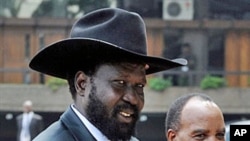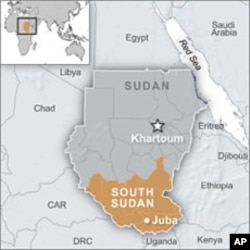Sudan is to hold elections next month, and the ruling party of South Sudan is crisscrossing the region asking for votes. The former rebels' case to stay in power rests on a peace deal signed five years ago, and a promised secession vote now 10 months away.
South Sudanese President Salva Kiir steps out of his plane and into the sun of Sudan's Eastern Equatoria state, where he is instantly greeted by the swarming crowd of Toposa villagers.
Men drum and women dance. Cheers, chants, and whistles drown out the stern orders flowing from the president's security men.
Mr. Kiir and his running mate, the semi-autonomous region's vice president, Riek Machar, jump into the back of a waiting pickup truck, waving as they push through the swaying sea of people towards the dusty sun-baked Kapoeta town square.
The townspeople coalesce into a wide semicircle around the makeshift platform, raising campaign banners as designated youth from the village lead the crowd in party chants.
For the former rebel Sudan People's Liberation Movement Party, and for Mr. Kiir, these elections mark less a serious challenge at the polls than an opportunity to re-mobilize southerners around their rule.
The party lacks a strong unified opposition in the South. The sole presidential candidate running against Mr. Kiir has based himself in Khartoum, the seat of the South's long-time Arab foes and now shaky peace partners, and is not likely to approach Mr. Kiir's numbers for the region's top seat.
SPLM's main threat in the polls comes not from without, but within. A heavily-criticized behind-closed-doors party nomination process has pushed disgruntled party politicians into declaring themselves independent candidates for the region's governorships. Some, local analysts say, could win.
But internal squabbles aside, the former rebels have mostly managed to retain general popular support during its five years of peacetime rule.
When asked to point out the achievements of his party, Eastern Equatoria state legislator Angelo Lomoi says the former rebel group's primary credential remains the negotiated end to the two-decade civil war.
"The first thing they did is that they brought the peace, the CPA, and they have maintained that peace," he said.
On the campaign trail, references to the 2005 Comprehensive Peace Agreement are quick off the tongue of every speaker. Synonymous with the CPA for most southerners is the much-anticipated independence referendum included in the pact, now scheduled for January 2011.
At a campaign stop in Eastern Equatoria's town of Nimule later the same day, the local county commissioner Emilio Iggo gives little doubt as to what outcome he thinks his people expect from the secession vote.
"We know this is not the end of the journey. We have still the referendum to come that will give the last destination where we get our freedom. Everybody in this county is behind you. SPLM oye! Salva Kiir oye!" he said.
Analysts say the glue holding the party together remains the region's quest for self-determination, fueled by deep resentment against the country's northern rulers. Many think the real test for southerners will arise in the possible event the region achieves political separation, when many fear the region could begin fragmenting into competing interests.
The former rebels are vulnerable to inner strife, as indicated by the splinter independent candidates. Deep tribal tensions simmer under the region's political surface, and the region carries a long history of bloody ethnic-based divisions.
Mr. Kiir's running mate, Mr. Machar, led a 1991 split in rebel ranks that proved a serious setback for the movement and caused the deaths of thousands in the subsequent infighting. It took the rebels the rest of the decade to slowly re-unify, and root grievances remain. Last year, over 2500 were killed in the South and over 350,000 displaced during internal clashes.
Even the party's critics admit the southern rebels were handed a tall task in the peace deal, granted reign over one of the world's most undeveloped stretches, while possessing little institutional capacity to carry out much immediate change.
One unexpected turn of events struck SPLM especially hard. Just months after the peace deal was signed, the party lost its charismatic leader, John Garang, who is revered postmortem as a near-god across much of South Sudan. While SPLM immediately rallied behind Mr. Kiir, the last remaining member of the rebellion's founding inner circle, detractors say he lacks his predecessor's political vision and tenacity.
If the region gets its independence, Mr. Kiir and SPLM will be given the chance to prove critics wrong.
But for now, the former rebels are urging the Southern Sudanese to remember the peace deal signed five years back and focus on another vote less than one year ahead. At that time, they say, the people can claim their long-sought prize.





